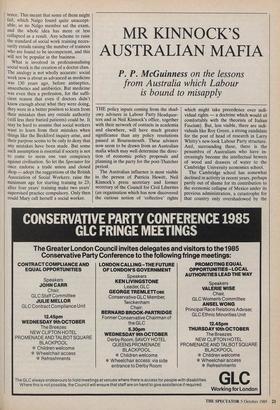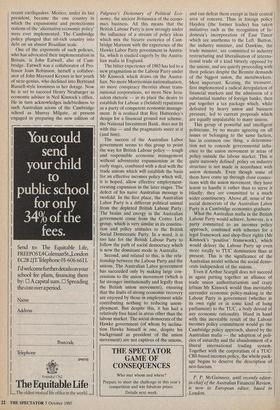MR KINNOCK'S AUSTRALIAN MAFIA
P. P. McGuinness on the lessons
from Australia which Labour is bound to misapply
THE policy inputs coming from the shad- owy advisers in Labour Party Headquar- ters and in Neil Kinnock's office, together with their network of contacts in academia and elsewhere, will have much greater significance than any policy resolutions passed at Bournemouth. These advisers now seem to be drawn from an Australian mafia which may well determine the direc- tion of economic policy proposals and planning in the party for the post-Thatcher period.
The Australian influence is most visible in the person of Patricia Hewitt, Neil Kinnock's press secretary and former secretary of the Council for Civil Liberties (an organisation which has now discovered the curious notion of 'collective' rights which might take precedence over indi- vidual rights — a doctrine which would sit comfortably with the theorists of Italian Fascism). But, less visible, there are indi- viduals like Roy Green, a strong candidate for the post of head of research in Larry Whitty's new-look Labour Party structure. And, surrounding these, there is the penumbra of Australians who have in- creasingly become the intellectual hewers of wood and drawers of water to the Cambridge University economics school.
The Cambridge school has somewhat declined in activity in recent years, perhaps partly out of shame for its contribution to the economic collapse of Mexico under its previous administration, a catastrophe for that country only overshadowed by the recent earthquakes. Mexico, under its last president, became the one country in which the expansionist and protectionist notions of the 'alternative economic policy' were ever implemented. The Cambridge policy plunged that oil-rich country into debt on an almost Brazilian scale.
One of the exponents of such policies, who has advocated their implementation in Britain, is John Eatwell, also of Cam- bridge. Eatwell was a collaborator of Pro- fessor Joan Robinson, herself a collabor- ator of John Maynard Keynes in her youth of near-genius, who declined into Bertrand Russell-style looniness in her dotage. Now he is set to succeed Henry Neuburger as economic adviser in Neil Kinnock's office. He in turn acknowledges indebtedness to such Australian scions of the Cambridge school as Murray Milgate, at present engaged in preparing the new edition of Palgrave's Dictionary of Political Eco- nomy, the ancient Britannica of the econo- mics business. All this means that the British Labour Party is now strongly under the influence of a stream of policy ideas which mix the bizarre esoterica of Cam- bridge Marxism with the experience of the Hawke Labor Party government in Austra- lia, which is studied eagerly by the Austra- lian mafia in England.
The bitter experience of 1983 has led to a new pragmatism in the Labour Party under Mr Kinnock which draws on the Austra- lian. No more Morrisonian nationalisation, no more conspiracy theories about trans- national corporations, no more New Jeru- salem rhetoric — in its place the desire to establish for Labour a (belated) reputation as a party of competent economic manage- ment. It is realised that Roy Hattersley's design for a financial ground nut scheme, the National Investment Bank, does not fit with this — and the pragmatists sneer at it (and him).
The success of the Australian Labor government seems to this group to point the way for British Labour policy — tough and responsible economic management without adventurist expansionism in the early stages, combined with a deal with the trade unions which will establish the basis for an effective incomes policy which will, it is hoped, allow effective employment- creating expansion in the later stages. The defect of his naive Australian message is twofold. In the first place, the Australfan Labor Party is a different political animal from the depleted British Labour Party. The brains and energy in the Australian government come from the Centre Left group, which is very similar in its constitu- tion and policy attitudes to the British Social Democratic Party. In a word, it is too late for the British Labour Party to follow the path of social democracy which is now the dominant mode in Australia.
Second, and related to this, is the rela- tionship between the Labour Party and the unions. The Australian Labor government has succeeded only by making large con- cessions to the union movement (which is far stronger institutionally and legally than the British union movement), ensuring that the fruits of strong economic recovery are enjoyed by those in employment while contributing nothing to reducing unem- ployment. But despite this, it has had a relatively free hand in areas other than the labour market. The social democrats of the Hawke government (of whom by inclina- tion Hawke himself is one, despite his background as president of the union movement) are not captives of the unions, and can defeat them except in their central area of concern. Thus in foreign policy Hayden (the former leader) has taken initiatives such as the recognition of In- donesia's incorporation of East Timor which are anathema to the Left. Button, the industry minister, and Dawkins, the trade minister, are committed to industry restructuring and liberalisation of interna- tional trade of a kind bitterly opposed by the unions, and are quietly proceeding with their policies despite the Bennite demands of the biggest union, the metalworkers. Most important, Keating, the treasurer, first implemented a radical deregulation of financial markets and the admission of a substantial number of foreign banks, then put together a tax package which, while defeated by heavy union and business pressure, led to current proposals which are equally unpalatable to many unions.
This group of powerful and intelligent politicians, by no means agreeing on all issues or belonging to the same faction, has in common one thing, a determina- tion not to concede governmental influ- ence to the union movement in areas of policy outside the labour market. This is quite narrowly defined: policy on industry structure is not made in accordance with union demands. Even though some of them have come up through close connec- tions with the union movement, they have learnt to handle it rather than to serve it blindly; they are committed to a much wider constituency. Above all, none of the social democrats of the Australian Labor Party is a Cambridge economics graduate.
What the Australian mafia in the British Labour Party would achieve, however, is a party committed to an incomes policy approach, combined with schemes for a legal framework and shop-floor rights (Mr Kinnock's 'positive' framework), which would deliver the Labour Party up even more totally to TUC domination than at present. This is the significance of the Australian model without the social demo- crats independent of the unions.
Even if Arthur Scargill does not succeed in again putting together an alliance of trade union authoritarianism and crazy leftism Mr Kinnock would thus inevitably surrender economic policy-making in the Labour Party in government (whether in its own right or in some kind of hung parliament) to the TUC, a body devoid of any economic rationality. Hand in hand with this inevitable result of the Labour incomes policy commitment would go the Cambridge policy approach, shared by the Australian mafia — the adoption of poli- cies of autarchy and the abandonment of a liberal international trading system. Together with the corporatism of a TUC/ CBI-based incomes policy, the whole pack- age begins to deserve the description of neo-fascism.
P. P. McGuinness, until recently editor- in-chief of the Australian Financial Review, is now its European editor, based in London.



























































 Previous page
Previous page